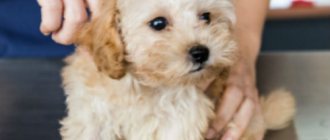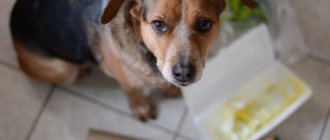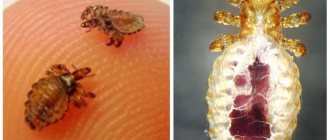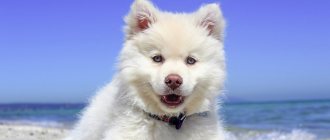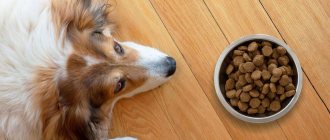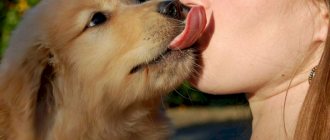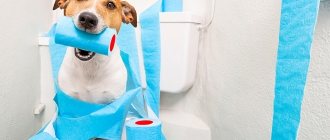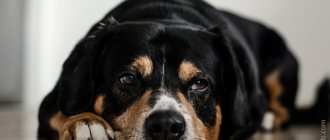Alena Igorevna Goncharenko
veterinarian Petstory
Diarrhea in a puppy is always an unpleasant situation. There are many reasons contributing to this. For example, poor nutrition. The main treatment method in this case will be diet correction. Puppies are extremely susceptible to infection by parasites and viruses; these conditions must be prevented through timely treatments and vaccinations. In this article, we will try to figure out why the puppy goes to the toilet loosely.
- Uncomplicated diarrhea
- If a prompt visit to the veterinarian is not possible
Diarrhea in a puppy: the main thing
- Diarrhea in puppies is quite common and often goes away on its own without treatment.
- Prolonged diarrhea or complicated by vomiting, refusal to eat, lethargy, or bleeding is extremely dangerous for small puppies.
- Treatment will depend on the cause of the diarrhea.
- Timely treatments, vaccination and proper feeding are the best ways to prevent diarrhea.
What to feed a dog with diarrhea?
If a dog develops diarrhea, many novice dog breeders do not know what to do. Any beginning diarrhea in a dog, treatment begins with a diet. For half a day or a day, your pet should be given exclusively fresh water, without offering food. Next, the animals are offered boiled chicken, thermally treated chopped beef, and boiled rice. The four-legged friends are transferred to a regular diet after a few days. It is advisable to prescribe medications in the form of antibiotics, anthelmintics and other strong drugs after tests.
Possible causes by age
At each specific age, there are some of the most common reasons why a puppy diarrhea. This does not mean that at one age only one reason is possible, and at another - only others. But diagnosis always starts with the most probable, so let’s look at this in more detail.
Diarrhea in a puppy 0-1 month old
Diarrhea in a newborn puppy can be dangerous. It is at this age that he is most vulnerable. Puppies cannot yet move independently, cannot see or hear, but they already have a well-developed sucking reflex. After birth, their first feeding begins with maternal colostrum. Colostrum contains the maximum amount of antibodies that can protect the puppy from viral infections. If you don't let your puppy nurse for the first few hours after birth, he will develop far fewer antibodies and be extremely susceptible to infection. But, in addition to antibodies, substances that the body does not need can be transmitted to the puppy through mother’s milk. For example, if a bitch receives some kind of medication, this may cause poisoning and diarrhea in her cub. In such a situation, it is necessary to transfer the puppy to artificial feeding. There may be another problem here - feeding with unsuitable milk. For artificial feeding of puppies, there are special ready-made mixtures that must be diluted with water. Only ready-made mixtures contain all the nutrients, vitamins and minerals necessary for proper growth and development. Often, small puppies are fed cow's or goat's milk, adding yolk and vitamins. Such a diet is very likely to lead to poor digestion, diarrhea, vomiting, and slow growth. The milk of different animal species differs significantly in its composition, and most importantly, in its content of fat, protein and sugar. Feeding the wrong type of milk is possible only as a last resort, when there is no way to purchase formula for dogs. In rare cases, puppies have individual allergic reactions to a formula from a certain manufacturer, which is manifested by loose stools. But when switching to a mixture from another company, everything usually resolves itself.
After 1 month, the puppy begins a new stage of growth, and you can begin to introduce complementary foods, following some rules. This should be done smoothly, in small portions, without immediately excluding breast milk. It’s better to start with special starter mousses, which many food manufacturers have. If you introduce complementary foods too abruptly (exclude milk completely, give a large portion at once), this can cause diarrhea. Food that is incorrectly selected according to age can also lead to diarrhea. Food for adult animals is not suitable as a first complementary food, because it has a completely different consistency and contains a different set of nutrients.
Before mating, the bitch must be treated for parasites. If this is not done, there is a high probability of infection of the puppies. The presence of helminths in the intestines will manifest itself in the form of diarrhea or vomiting. Many drugs, according to the instructions, are suitable for treating puppies from 3 weeks of age. If treatment is required earlier, this must be agreed with a neonatologist. He will help you choose the drug and dosage. It is not recommended to give medications independently and not according to instructions.
Diarrhea in a puppy 2-3-4 months old
From 2 months, puppies can be partially or completely fed on their own. When feeding a puppy with industrial ready-made food, you need to choose diets for dogs older than 2 months, but in no case should you give food for adult animals. If you plan to continue feeding with a home diet, then such nutrition should be discussed with a nutritionist. Unbalanced feeding very often leads to problems with the gastrointestinal tract and, as a result, diarrhea.
Starting at about 8 weeks of age, puppies run out of colostral immunity and are at risk of contracting various infections. Parvovirus enteritis is one of the most common infectious diseases of the stomach and intestines of puppies of this age. This is a very dangerous disease with high mortality, manifested primarily by diarrhea, often simultaneously with vomiting. In the absence of an ambulance, the puppy can die in a matter of hours. Canine distemper can also cause diarrhea in puppies. This is an even more dangerous condition, since, in addition to the intestines, it also affects the respiratory organs, skin, and nervous system. In recent years, plague has been recorded very rarely, which is due to conscientious vaccination. Before full vaccination and quarantine, under no circumstances should the puppy be allowed to come into contact with the street or unfamiliar dogs. You should wash your hands thoroughly before handling or feeding puppies. If the puppy has completed the full course of vaccination at 2 and 3 months, then he has very little chance of becoming infected. The vaccine does not provide a 100% guarantee of avoiding infection, but the disease in such dogs occurs in a much milder form. If your puppy over 2 months of age suddenly develops diarrhea and you don't know what to do about his loose stool, contact your veterinarian.
Diarrhea in a puppy 5 months and older
The causes of diarrhea in puppies older than 5 months are the same as those already mentioned. Often this is incorrect feeding with unbalanced food, various “goodies” from the table in the form of sausages, dried bread and other things. If the puppy has not been vaccinated, the risk of infection still remains. At this age, the puppy is already very active and should walk outside a lot. And this carries with it the risk of the baby eating inedible objects. Eaten sticks, bones, toys, bags can cause intestinal damage and partial obstruction, which will be accompanied by diarrhea. Also, when picking up on the street, there is a high risk of helminths entering the body. It is recommended to treat puppies up to 6 months monthly, then once every 3 months.
First aid at home
If we are talking about diarrhea due to poor nutrition or mild poisoning, you can try to help the puppy yourself.
- Organize a small hunger strike for the puppy. Let the contents of the stomach and intestines be released entirely; the arrival of new food can increase the spread of infection in the gastrointestinal tract, and fasting, on the contrary, will relieve inflammation. The fasting period for large breeds is from 12 to 24 hours, for miniature breeds and newborn puppies - no more than 6-10 hours.
- Prevent dehydration. Pour warm, boiled water into a clean bowl for your puppy so he can drink at any time. If the puppy does not show interest in water for a long time, give it a drink using a syringe without a needle. Do not give the puppy too much water at once in this way; it is better to give little, but often. If the puppy becomes noticeably dehydrated, an IV can be placed.
- Clean up on time. To prevent the spread of infection, remove feces immediately and clean the tray and bedding thoroughly.
- Give your puppy absorbents. Vomiting and diarrhea remove harmful components from the body, but in order to speed up this process and alleviate the puppy’s condition, it is good to give adsorbents. Activated carbon, Enterosgel (softer and more effective than coal), Smecta (be careful, it cannot be given simultaneously with other drugs) are well suited for this purpose.
- You can try to make your puppy vomit. To do this, you will need a solution of potassium permanganate (bring the liquid to a slightly pinkish color), saline solution (1 tablespoon per full glass of water) or a mixture of water with 3% hydrogen peroxide (mix in equal proportions). Give one of these remedies to your puppy, preferably warm. This will speed up the healing process for minor poisonings.
Read Symptoms of patella in dogs and effective treatments
Be careful with the dosage of adsorbents, follow the instructions. Puppies at 1 month and at 2 months require different amounts of medication. At 3 months, when the permanent teeth begin to emerge, you can give your puppy something to chew on to relieve pain.
Possible manifestations of diarrhea
Loose stools may be uncomplicated. It may also be accompanied by vomiting or blood and mucus.
Uncomplicated diarrhea
This can be called short-term diarrhea, which resolved on its own. This is possible, for example, when eating something that is not suitable for the usual diet. For example, dogs do not refuse to eat sausage, cheese, and sweets. But any violation of the diet can lead to a deterioration in the quality of stool. If diarrhea is not accompanied by vomiting, refusal to eat and goes away on its own within a day, then this condition is not considered critical and is required to visit a doctor.
With mucus
Often, along with the puppy’s loose stool, you can notice the presence of mucous films in it. Sometimes diarrhea can be completely surrounded by mucus. Mucus is secreted by goblet cells, which are found primarily in the large intestine. Its presence indicates that the process occurs in the large intestine or simultaneously in it and other areas. Most often, mucus in a puppy's stool will be a sign of the presence of parasites. Puppies are prone to infection with parasites because they are very curious and try everything. Intestinal parasites include helminths and protozoa. Most often you can find a round helminth, Toxocara, or a flat helminth, dipylidia. In this case, infection with dipylidia most often occurs through fleas. They are carriers of the eggs of this helminth, so you should not neglect flea treatments either. Of the protozoan parasites, the most common are Giardia and Coccidia. Also, mucus in loose stool in puppies with diarrhea can be a sign of improper feeding, various viral and bacterial infections.
Diarrhea accompanied by vomiting
If diarrhea is accompanied by vomiting, this is a reason to immediately contact the clinic. Since dehydration occurs very quickly, even before a final diagnosis is made, the puppy already requires first aid. Vomiting and diarrhea are often a sign of a viral illness. Parvovirus enteritis is an extremely dangerous disease that requires round-the-clock inpatient monitoring. Under no circumstances should you treat this infection yourself. The virus infects intestinal cells, leading to deterioration of their performance and inflammation. In the smallest puppies, the virus can even affect the heart muscle. Often the main cause of death for a puppy is dehydration, so good hydration is extremely important. There are no antiviral drugs that can defeat this virus. Another viral infection of puppies is canine distemper. In recent years, this disease has been reported quite rarely, but the mortality rate when infected is still extremely high. The virus can infect intestinal cells, causing diarrhea and vomiting. It also penetrates into other organs - the skin, respiratory and nervous systems.
Also, diarrhea may be accompanied by vomiting due to food poisoning (poisoning), eating inedible objects, or the presence of a large number of parasites in the intestines. Systemic diseases such as pancreatitis and liver disease are quite rare in puppies. Any case of diarrhea with vomiting should be discussed with a doctor. This condition requires research and urgent treatment.
With blood
In some cases, diarrhea may be accompanied by blood in the stool. Most often, small streaks or blood clots appear after diarrhea of quite a long duration. This is due to rupture of capillaries due to intestinal strain and constant tenesmus. If the blood in the diarrhea is profuse or flows from the butt without stopping, this may indicate serious intestinal bleeding or a violation of the blood clotting function. Bleeding is possible, for example, when eating sharp bones, sticks, or glass. Violation of blood clotting function often occurs due to poisoning with rodenticides - means for fighting rats. They are usually placed in something tasty and attractive to rats, but a curious pup may want a treat too. Anaplasmosis is an infectious disease transmitted by ticks. Anaplasmas invade platelets and destroy them, causing the blood to fail to clot adequately and causing intestinal bleeding. There is also a genetic abnormality called Von Willebrand disease. Dog breeds such as Doberman, Welsh Corgi, Bernese Mountain Dog, Coton de Tulear, Papillon, and Poodle are more susceptible to this disease. The disease is manifested by a decrease in blood coagulation function due to a genetic defect and, as a result, bleeding. All of these cases require emergency veterinary care and should under no circumstances be observed at home.
After vaccination
In rare cases, diarrhea may occur as a side effect of the vaccine due to decreased immunity. If the diarrhea is one-time and goes away on its own, then there is no need to sound the alarm. But if the puppy develops diarrhea, accompanied by vomiting, in the first hours after vaccination, this is a reason to immediately return to the clinic. These symptoms may indicate an anaphylactic reaction and require immediate attention.
Melena
Melena is black, unformed stool that resembles tar, often with a foul odor. Melena is a symptom of bleeding in the stomach and upper intestines. At the exit, the blood turns black, as it has time to be digested by gastric juices and enzymes. Melena can be observed with injuries to the stomach and intestines due to eating sharp inedible objects. Melena is also the first sign of peptic ulcer disease. Ulcers in a puppy are most often associated with eating some chemicals (washing powder, vinegar).
Yellow diarrhea
For small milk-fed puppies, soft, light brown stools are normal. But if the stool is bright yellow, or the pet has been eating adult food for a long time, and its stool previously looked normal, then this is worth paying attention to. The most favorable reason for yellow, loose stools is eating some inappropriate foods (for example, a puppy drank a lot of cow's milk). But more threatening diagnoses are also possible, such as diseases of the liver, gallbladder or pancreas. If such a stool is detected, you should immediately undergo examination.
Hurry up, choose a box and find out what gift awaits you
Discount on pet insurance
Promo code copied to clipboard
A dog has yellow diarrhea with mucus: Mechanism of development
Diarrhea (diarrhea) is a condition that is not normal for the body and is characterized by an increase in the amount of feces. This is mainly due to an increase in the water component, which becomes 60-90%.
Also, with diarrhea, defecation (separation of intestinal contents) becomes more frequent, more than 4-5 times a day.
Why does diarrhea occur? Under the influence of various factors, the absorption of substances in the intestines, including water, is impaired, peristalsis is accelerated, and an inflammatory process occurs.
In this case, the chair can be painted in different colors:
- Yellow . For diseases of internal organs.
- Green . With excessive amounts of bile.
- Red . Bleeding of the large intestine.
- Black . Bleeding in the stomach or small intestine.
- White . Impaired flow of bile.
Some medications that a dog takes can affect the color; for example, after activated charcoal, you should not be surprised by black feces.
The color of food also directly affects what it turns into after digestion.
By its nature, diarrhea can be infectious or non-infectious. The course is acute and chronic. With the latter type, diarrhea lasts for several weeks or even months.
Why can diarrhea be dangerous?
The main danger of diarrhea is that such feces remove a large volume of fluid from the body along with nutrients. Loss of fluid in feces leads to dehydration, thickening of the blood, and deterioration in the performance of all organs and tissues. Normally, at least 60% of all fluid entering the body is absorbed in the small intestine, and with diarrhea, almost all of this fluid will be excreted along with feces. With prolonged diarrhea, animals very quickly lose weight, become lethargic, and eat poorly. Body temperature can be either elevated or decreased. Puppies that refuse to eat, are vomiting or have multiple watery stools, have blood in them, or have an altered body temperature require an immediate visit to the doctor. Without treatment, this condition can become critical for the pet, and its death is possible.
If a prompt visit to the veterinarian is not possible
But what to do if your puppy has loose stools? Self-treatment of diarrhea is possible only in the absence of complicating factors and in the general satisfactory condition of the pet. At home, a puppy can be given enterosorbents for diarrhea 1–2 hours before or after meals, which should help in mild cases. Improvement should occur no later than 1–2 days after the start of treatment. Otherwise, you should look for opportunities to contact a veterinarian. Under no circumstances should you independently prescribe antibiotics or anti-inflammatory drugs to your pet, or give him solutions from traditional medicine. All these actions can only worsen the condition and complicate the doctor’s work.
Help at home
If your pet has developed intestinal problems relatively recently, you can try to help the puppy yourself. What you need to do from the very beginning:
- fill the animal’s bowl with clean filtered, not cold water (do not replace the water with another drink - milk or soup broth);
- during illness, remove excrement immediately, wash the tray and bedding thoroughly - this will protect against the spread of infection, if any;
- do not give food to the puppy for 24 hours;
- Do not force the animal to drink in the first hours.
Rapidly developing diarrhea throughout the day may be the first sign of a bacterial or viral infection. Under such circumstances, it is not advisable to delay a visit to the veterinarian. The best option would be to invite a doctor to your home so as not to tire your already sick pet and not create unnecessary discomfort for him.
Unfortunately, sometimes it is impossible to cure an animal at home, but you can always alleviate the animal’s condition before a specialist arrives. The most important thing is to avoid dehydration and be extremely attentive to other symptoms that may appear within a few days.
Diagnostics
Diagnosis of diarrhea is based, first of all, on collecting a detailed medical history of the pet. It is necessary to tell the doctor in great detail about what the puppy eats now and what he ate before. What kind of treats does he receive, when and with what preparation was he treated against parasites, was he vaccinated, can he pick up something from the floor or on the street, does he chew on his toys. You shouldn’t hide the most inconvenient moments from the doctor, for example, how you didn’t keep track and the puppy ate his diaper. These data will greatly facilitate making the correct diagnosis and, accordingly, prescribing treatment.
Additional diagnostic methods may include blood tests. A clinical blood test will show the presence of dehydration; if red blood counts are elevated, a decrease will indicate anemia. An increased level of leukocytes will reveal the inflammatory process, a shift in the leukocyte formula to the left will indicate the severity of this inflammation, and increased lymphocytes will rather indicate the bacterial nature of the inflammation. A decrease in the level of leukocytes often indicates the viral nature of the disease, which is very typical for parvovirus enteritis. The level of albumin and potassium in the biochemical analysis will indicate whether serious losses have occurred due to diarrhea.
PCR studies are used to confirm the infectious nature of the disease. If there remains a suspicion that the puppy has eaten a foreign object, tests such as abdominal ultrasound and x-rays are performed. In doubtful cases, after feeding the puppy a contrast agent, a series of x-rays may be taken to determine the location of the foreign object.
If the parasitic nature of diarrhea is suspected, different diagnostic tactics may be proposed. It can be difficult to confirm the presence of parasites in feces in a laboratory. Helminth eggs are not released with every bowel movement, and you may not guess on what day the analysis needs to be collected. In this case, it is recommended to donate stool several days in a row. To detect protozoa, feces must be delivered to the laboratory as fresh and warm as possible; within half an hour, all parasites may die, and nothing will be found in the laboratory. Due to these difficulties, your doctor may suggest a trial treatment plan for parasites. The success of therapy will indicate a correct diagnosis.
Next, we will look at what is done when a puppy has diarrhea, and what treatment is necessary in this case.
German Shepherd – causes of diarrhea, treatment and prevention
The best qualities of this breed are manifested in well-groomed dogs with good health, the maintenance of which consists of attention and painstaking work on the part of the owner. To ensure optimal physical condition of a German Shepherd, a balanced diet with a predominance of protein foods is necessary. The daily menu should include boiled eggs, dairy products, fish, cereals, boiled vegetables, with the exception of potatoes, which are poorly digested by dogs and have almost no benefit. If natural feeding is used, vitamins should be added to the food.
Giving your pet pasta and flour products is not recommended, as they impair its performance and can cause obesity. The list of undesirable foods also includes sausages, beans, smoked and pickled foods. It is necessary to calculate the portion of food for one meal for an adult dog, taking into account the weight of the animal and the nutritional value of the food. To ensure that the puppy's skeleton is formed correctly, when feeding small German Shepherds, you should use a special stand that allows you to adjust the height of the bowl. The optimal height is at chest level.
This breed is characterized by hereditary visual impairments and diseases of the musculoskeletal system. The best place to keep a German Shepherd, as well as representatives of other large breeds, is a covered outdoor enclosure. For such a dog to live comfortably in a city apartment, it is necessary to designate the object that it needs to protect and give it the opportunity to feel its importance.
Treatment
Uncomplicated diarrhea often resolves on its own and does not require treatment. If diarrhea has been going on for some time or is accompanied by other symptoms (blood in the stool, vomiting, lethargy, refusal to eat), treatment will be required. Even before diagnosis, small puppies are given maintenance volumes of crystalloid solutions subcutaneously or intravenously. Symptomatically, you can start using enterosorbents; they will bind all the toxins in the intestines. If intestinal parasitosis is confirmed, antiparasitic treatments are prescribed. It is believed that deworming medications in the form of drops on the withers do not work well in dogs, so it is recommended to carry out treatments in the form of tablets.
If a foreign object is detected in the intestine, in most cases surgical intervention will be required. Infections are treated comprehensively, using antimicrobial agents, painkillers, and gastroprotectors. Antimicrobial agents used include penicillins, macrolides, and metronidazole. Painkillers are usually used in hospital treatment as infusions at a constant rate, so that the analgesic effect can be provided exactly for the required time. Gastroprotectors protect the gastric mucosa and normalize the pH of gastric juice. Your doctor will tell you what to feed your puppy if he has diarrhea. Often, for diseases of the stomach and intestines, a therapeutic diet is prescribed. Specialized foods are easily digestible and also help restore the intestinal mucosa. If diarrhea was caused by dietary errors, a therapeutic diet is prescribed to normalize stool, which is usually sufficient in this situation.
Therapeutic diet and drinking regime
If your pet has diarrhea, the first step is to put him on a 12-24 hour fasting diet. Representatives of dwarf breeds, as well as newborn puppies, should not be fed for more than 6-10 hours. In this case, the pet must have constant access to fresh drinking filtered water.
If the animal refuses to drink on its own, pour water into the mouth in small portions through a regular syringe without a needle. Water can be replaced with tea or herbal infusions with the approval of a veterinarian - you will receive an initial consultation by phone. It may be easier for your dog to lick an ice cube - this is a good solution if he is vomiting.
“ Please note that giving a puppy solid food when it has diarrhea is strictly prohibited. Especially if there is mucus in the excrement. Eating food can trigger vomiting and will only make the situation worse.
Fasting relieves inflammation in the intestines and gastrointestinal tract, and also stops minor internal bleeding. To normalize the electrolyte balance and replenish fluid loss in the body, give the puppy Regidron solution.
In severe advanced cases, infusion therapy is carried out in a veterinary clinic. Physiological solutions (isotonic glucose, Ringer-Locke solution) are administered intravenously to puppies.
Every dog owner should know what to feed his puppy when he has diarrhea - this will come in handy at least once in his life. Symptoms of diarrhea are quickly relieved by steep rice decoction, decoction of oak bark, chamomile, St. John's wort, sage, and yarrow. These simple and affordable remedies have an astringent and anti-inflammatory effect. Before use, consult a veterinarian.
“ At the first signs of improvement, you can give the puppy boiled chicken or turkey meat, veal, or lean broth. An alternative is dietary wet food.
Gradually introduce fermented milk products into your diet - low-fat cottage cheese, natural yogurt, kefir. Fermented milk nutrition has a beneficial effect on the gastrointestinal tract and normalizes the intestinal flora. For porridges, it is best to give buckwheat, rice, oatmeal, cooked in water or meat broth. Introduce new foods into your diet gradually, in small portions.
Food must be crushed for at least the first 3-4 days to make it easier for the intestines to digest it. The daily portion is divided into many small parts and served warm to the puppy more often than usual. If the dog refuses to eat, there is no need to force him - but you will definitely have to give him water.
Dry food is excluded from the diet for a while, replacing it with natural food or wet diet food. All dishes must be fresh and of high quality.
Prevention of diarrhea
The main preventive measure should include proper balanced feeding. Feeding puppies of different ages requires different types of food: mother's milk or mixtures - bitch milk replacers, starter mousses, puppy food. For proper feeding with a natural diet, consultation with a nutritionist is required. Preventive vaccination is carried out at the age of 8 weeks, then at 12 weeks. Up to 6 months of age, it is recommended to treat puppies for helminths monthly, then at least once every 3 months. It is necessary to prohibit the puppy from chewing its toys, picking up everything from the floor and from the ground on the street.
Your dog has loose stools with yellow mucus: Prevention
To prevent gastrointestinal disorders in dogs, you should follow these rules:
- Monitor your dog's diet. Do not use food that is of low quality and not intended for your pet.
- Deworming 3-4 times a year, even if your miniature Chihuahua does not walk outside.
- Vaccination against infections annually. If you don’t want to go to the clinic, you can call a doctor for a fee.
- Buy a puppy with vaccinations, preferably older than three months and from a trusted place: close friends, shelter, nursery.
- Regularly examine pets older than 5 years or with chronic diseases. At least once a year.
- If your dog tends to pick up on the street ( read how to stop it here ), then wear a muzzle for walks or use the services of a dog handler who will help correct the pet’s behavior.
- Explain to grandparents and children that the dog should not be fed.
Quantity
Shar Pei - causes of diarrhea, how to treat, prevention
Representatives of the breed are known as excellent watchdogs, intelligent, freedom-loving and very strong animals with a good appetite. The folded skin and ears of Shar-Peis are their vulnerable spot, so when bathing, the ears should be covered, and the coat should be thoroughly dried after bathing to avoid microbial and skin diseases. Shar Peis are picky eaters and are prone to food allergies. Therefore, it is not recommended to frequently change their food, enriching it with vitamin supplements until the age of one and a half years. Food should be thick and dry, and broths and soups should not be given to dogs of this breed.

